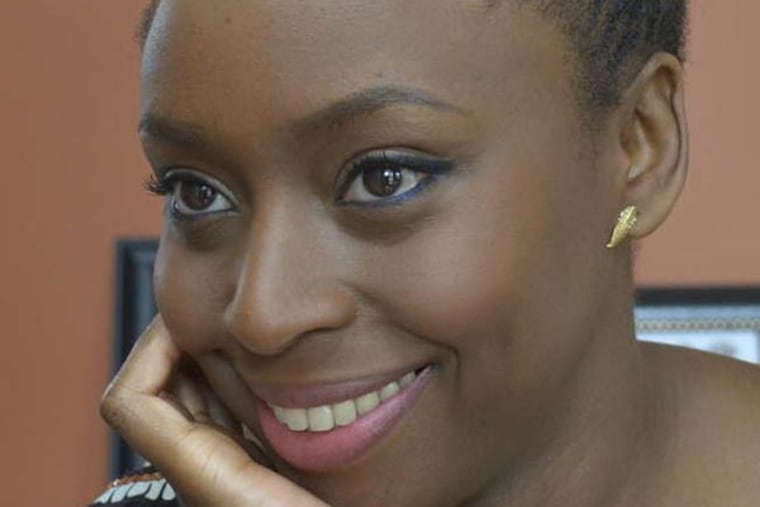'Americanah' a sprawling novel on poisonous racism
Chimamanda Ngozi Adichie is a MacArthur Fellow and onetime Drexel University student who, as every available blurb says, "splits her time between Nigeria and the United States." Her brave, sprawling novel Americanah tackles the U.S. race complex with a directness and brio no U.S. writer of any color would risk.

Americanah
By Chimamanda Ngozi Adichie.
Alfred A. Knopf. 496 pp. $26.95 nolead ends nolead begins
Reviewed by John Timpane
Chimamanda Ngozi Adichie is a MacArthur Fellow and onetime Drexel University student who, as every available blurb says, "splits her time between Nigeria and the United States." Her brave, sprawling novel Americanah tackles the U.S. race complex with a directness and brio no U.S. writer of any color would risk.
We start with a Nigerian couple, Ifemelu and Obinze. Much as Adichie herself did, Ifemelu leaves Nigeria for a U.S. education. Her progress is hard. Much happens in Trenton (where she gets her hair braided), Princeton (where she gets a research fellowship), and around Philly. Chilling but familiar.
Meantime, Obinze, barred from entering the United States, lives the subterranean life in London before finding success, but only of a financial kind, back home in Nigeria. He is, after all, waiting for Ifemelu, who is
the kind of woman who would make a man easily uproot his life, the kind who, because she did not expect or ask for certainty, made a certain kind of sureness become possible.
We get bracing looks at what arises from race in the United States: financial, social, and legal inequality; the legacy and shame of slavery; the resentments of conscience; victim-blaming; tribalism; race obsession and race unease; and the good old vintage stuff, toxic prejudice, true racial chauvinism, and discrimination.
The backdrop is the 2008 campaign and victory of Barack Obama. Ifemelu takes on board all the questions people in the United States at least thought Obama "raised" by his very existence. Many readers will recognize the dinner-party discussions. In a blog post titled "Even the Idea of Being Ready Is Ridiculous," Ifemelu writes:
Does nobody see how absurd it is to ask people if they are ready for a black president? Are you ready for Mickey Mouse to be president? How about Kermit the Frog? And Rudolph the Red-Nosed Reindeer?
The blog steals the show. Titled, unfortunately, Raceteenth, it gives us some of the best, funniest, most thought-provoking moments in Americanah. One of the most persuasive things in the novel is how Ifemelu gets famous because of it. Adichie makes sure Ifemelu's writing is flatter than her own, which I appreciate. Brutally direct discussions abound, of everything from sex to white privilege to Michelle Obama's hair.
Our main lens for examining these issues is the love life of Ifemelu. This is not the novel's strongest aspect. The love template doesn't always sit well over the social analysis. The narrative is too heavily weighted from her viewpoint, and I suspect a slight immaturity that is not Ifemelu's. Granted, love is a legitimate lens. The choice of whom to be with, whom to love, is also the choice of who to be, where to be. (Returning to Nigeria, Ifemelu remarks: "I feel like I got off the plane in Lagos and stopped being black.")
A breakup with a white U.S. boyfriend spurs the creation of Raceteenth. One of Ifemelu's first posts is this: "The simplest solution to race in America? Romantic love." But society is set up to make such love rare, even rarer between races, so there will be no solution.
There's no question of this or any novel's resolving the U.S. race sickness. If, for "the American Non-Black," it's so hard to say or do the right thing, what is to be done?
I'm not sure. Try listening, maybe. Hear what is being said. And remember that it's not about you. American Blacks are not telling you that you are to blame. They are just telling you what is.
That's both lame - because it certainly is not the only thing people should be doing - and touching, and distressing, since it implies that, for deep, deep reasons, there's still, as of 2013, not a lot of listening.
I'm not sure the end of Americanah really works. As often as we like both Obinze and Ifemelu, they hurt a lot of people and show some troubling spiritual bald patches. After all the novel's broad-scale social analysis, are we now to see that all the important problems of these two boil down to their search for love? Their longing to feel what they want to feel? I sure hope not.
Much is done and said in Americanah that will make readers of all ancestries uneasy. Good. Americanah brings a cleansing frankness to an old, picked scab on the face of the Republic. It's not healing, and it's not going away.